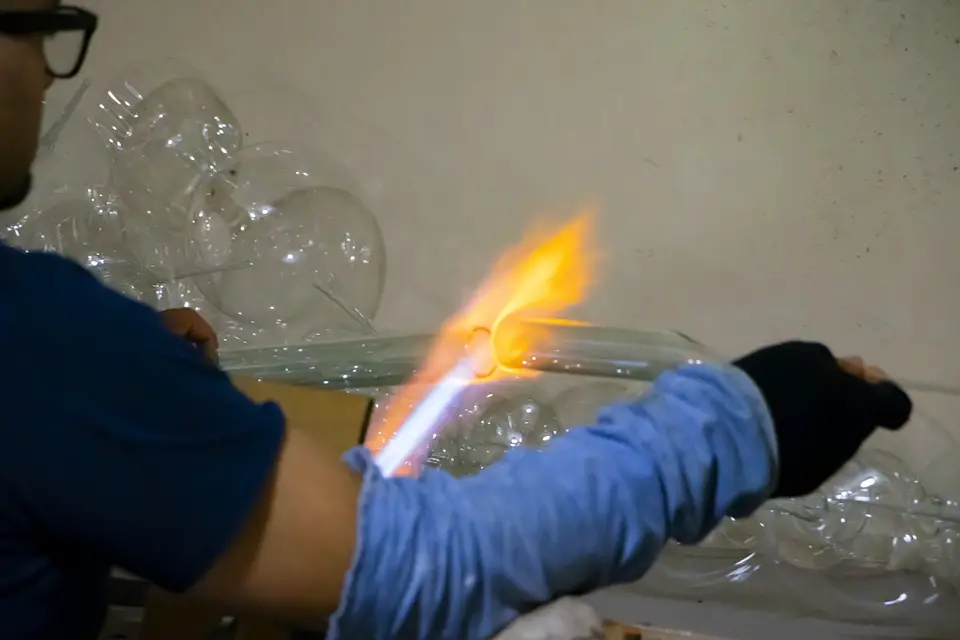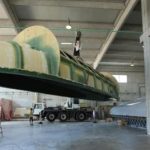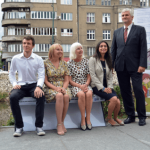As Poslovni Dnevnik/Lucija Spiljak writes, once upon a time, the City of Zagreb was a city full of crafts, where everyone could sew trousers and make tailor-made shoes with guaranteed quality. Today, we’re sadly witnessing more and more padlocks being forever placed on the doors of the once esteemed crafts. That said, some are still resisting these harsh, new times of mass production.
Among them is Koogle blown glass, a trade for the production of blown glass items in Gornji Stenjevac in Zagreb. It is a family glass-blowing craft which is almost 60 years old, run by Martina Simunkovic. It used to be a glass-blowing oasis, where, after the Second World War came to an end, about 200 households worked for a cooperative that would buy their products and place them on the market.
However, when it was extinguished not so longer after in the 1950s, the same fate befell the small workshops. Martina’s grandfather was among the last to continue his work, and eventually, he was the only remaining one. In addition to glassblowing, in the late 70’s and 80’s, he also introduced machines for the production of ground plastic items.
The business was then taken on and continued by his son, Martina’s father, and back in 2014 she brought the craft back to life, as the third generation of glassblowers in the family. Today, she makes various decorations using the technique of heating a hollow glass tube and blowing air out of her mouth.
By profession a historian, artist and ethnologist, she previously worked as the head of the Department for the Protection of Intangible Cultural Heritage at the Ministry of Culture.
“Art historians and ethnologists are always attracted by passion and hunger for beauty, and glass is an ideal medium where as a creative, I can express myself and make an object not only interesting to me, but something I’d would buy myself. For the last 15 years, our craft has been ”asleep”, so to speak. With the advent of large shopping centres and retail chains, the need for handmade products has sadly disappeared; there’s now mass production and it’s all imported and in other forms. We couldn’t compete with that, so my father closed the business down,” Simunkovic revealed.
Back when she worked in the aforementioned ministry, she was aware of the value of traditional crafts, but also how endangered and unstable the micro market is. However, she noted that customer interest in handmade items was beginning to return.
“Decorative items don’t really have an essential function, people buy them for details and aesthetics. I realised that customers were starting to turn more to these products and that there were more and more small family stores out there on the market that started offering these items from local workshops. That’s where i saw an opportunity to revitalise the Koogle glass blowing family business I grew up with, which would also satisfy my desire for creativity. I suggested to my father that we see how the market goes, and he was delighted when he pulled out some glass after a long time, quickly remembered everything and returning to his old routine. He taught me all of the techniques, and then in 2014, the story began again.
We’ve adapted to the market and to the wishes of our customers, but the backbone of our craft has remained the same – minimalism in decoration and natural and ecological materials. There are few of us glassblowers who make hollow blown glass products and decorations related to seasonal periods. Mine were exclusively Christmas decorations. It was hyperproduction, the whole family was involved, along with some outside glass blowers. The market was the former Yugoslavia, and some was exported elsewhere. We had enough customers considering the production capacity, a series of 100,000 pieces. We were based primarily on and around Christmas. At the end of the year, we had to sell what we’d produced throughout the year,” Martina recalls.
Today, the largest concentration of Koogle blown glass’ production is set aside for Christmas decorations, because that particular festive period is the most commercially viable for it. Considering that so far everything in the trade is done within it, their capacity is smaller, but they do try their best to cover the seasonal demand. Martina therefore decided to supplement the assortment, so she has different decorations for Easter as well.
The Koogle blown glass team also offers terrariums where plants can be grown, and Martina even joined the O2 Project, which aimed to raise awareness about forest conservation, and her creations proved to be the ideal incubators for seed growth and development. Today, her products are ordered by private individuals, but more and more, she says, she notices that companies need them at the time of giving gifts to their employees, partners and clients, with numerous inquiries for personalised gifts.
There is interest from outside of Croatia and the former Yugoslavia as well, and she is currently in negotiations with the European Entrepreneurship Network run by the Science and Technology Park of the University of Rijeka, which would connect her with potential associates and clients outside of Croatia and its immediate region.
For more, check out Made in Croatia.










